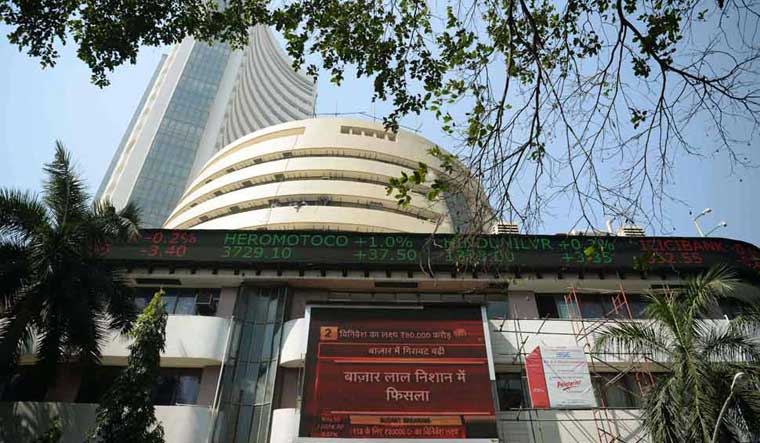Benchmark equity indices plunged on Friday, with the National Stock Exchange's Nifty 50 index closing below the 10,000 level for the first time this year, as a threat of an escalating global trade war rattled stock markets worldwide.
The Bombay Stock Exchange's Sensex tumbled 410 points or 1.2 per cent to close the day at 32,596.54 level and the Nifty 50 ended 117 points or 1.2 per cent lower at 9,998.05.
The sharp fall on Friday meant the Sensex ended the week 1.7 per cent lower and the Nifty 50 was down 1.9 per cent.
US President Donald Trump on Thursday signed a presidential memorandum that could impose tariffs up to $60 billion on imports from China. The move comes in the backdrop of the huge trade deficit US has with China, and Trump has been keen to boost manufacturing and jobs back home.
China was quick to retaliate, announcing plans to impose tariff on up to $3 billion worth US imports including pork, recycled aluminum, steel pipes, fruit and wine.
While, China says it doesn't hope to be in a trade war, it has warned that it won't be afraid of engaging in it.
This has spooked equity investors worldwide, worried as to how this tit-for-tat trade war will pan out and what impact it will have on the global economy, which was only just starting to pickup pace.
As risk appetite wanes, investors are rushing to safe-haven assets. Spot gold prices rose nearly a per cent, touching their highest since February 20 at $1,343.06 per ounce.
“Trade tensions are likely to dominate headlines in the near term, as it remains to be seen whether these developments escalate into a trade war or are watered down through concessions/negotiations. Risk appetite is nonetheless likely to be under a cloud until further clarity is achieved,” said Radhika Rao, economist at Singapore-based DBS Bank.
While Thursday's tariff imposition particularly targeted China, the US had already imposed tariffs on aluminium and steel imports, which will impact other countries.
“Such tariff wars come at a time when the world economy is just about getting out of the slow growth phase. Besides, tariff wars lead to higher costs and can upset the entire range of commodity prices. Therefore, collateral damage for other countries cannot be ruled out in terms of inflation as well as exchange rates,” said credit ratings agency CARE.
The imposition of tariffs on steel and aluminium, will impact India to a limited extent, as US accounts for 10 per cent of its iron, steel and aluminium exports, according to economists. More worry, though is on the services front, where US runs a deficit.
“With US and Canada accounting for over 60 per cent of the overall software exports for India, any restrictions there are likely to impact trade earnings and, by extension, the current account balance,” said Rao of DBS Bank.
Besides trade war fears, continued concerns over recent frauds in India's banking sector and the impact on banks' balance sheets continues to weigh.
Shares of Union Bank tumbled 8 per cent on reports that the CBI has registered a case against Hyderabad-based Totem Infrastructure for an alleged fraud, on a complaint by the state-owned lender.
Selling pressure was also seen in other banks; ICICI Bank, State Bank of India, Axis Bank, Punjab National Bank and Yes Bank all declined 2.50-4.0 per cent
Metals stocks were also under pressure; while Steel Authority of India Ltd slumped over 6.5 per cent, Hindalco, Jindal Steel and Vedanta ended close to 5 per cent lower.
Sun Pharma, Dr Reddy's, Tata Motors, Bajaj Auto, Larsen & Toubro and Reliance Industries were among the other major losers.
Indian markets have been under pressure over the last couple of months, worried over fiscal deficit concerns, the Nirav Modi fraud at Punjab National Bank, announcement of long-term capital gains tax on equity, interest rate hikes by US Federal Reserve and the recent set-backs for the BJP in by-elections. Analysts expect volatility to continue this year.
“Markets have been facing headwinds since the start of February, be it the imposition of LTCG or the much talked about banking fraud. This being a politically busy year in India, volatility can stay high for an extended period,” said Devang Mehta, head – equity advisory at Centrum Wealth Management.
He still advises long-term investors should continue to accumulate quality business, which may be available at reasonable valuations.


